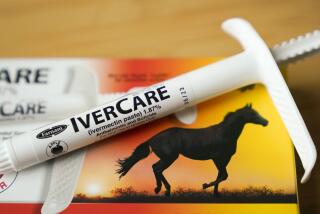Panel OKs Amgen Arthritis Medicine
- Share via
Amgen Inc. moved closer to entering the $6.9-billion market for rheumatoid arthritis drugs Thursday as a regulatory panel recommended approval of its experimental treatment Kineret.
The drug, which eases swelling and inflammation by suppressing the immune system, is expected to be an important diversification for Amgen, which relies on two strong-selling drugs.
The Food and Drug Administration is expected to follow the advice of its expert panel, which endorsed Kineret by a 6-2 vote. The drug will face intense competition from two existing treatments that also work by suppressing the immune system.
Those drugs, Immunex Corp.’s Enbrel and Johnson & Johnson’s Remicade, have made impressive inroads with doctors and patients since their introduction in 1998. Combined sales of the two medications topped $1 billion last year and should total $1.4 billion in 2001.
Analysts don’t expect Amgen to catch up to its rivals, whose treatments appear more effective. Fewer than half the patients who used Kineret in clinical trials experienced some relief of their symptoms. About two-thirds of patients who use either Enbrel or Remicade seem to benefit.
Amgen, however, stands to gain from marketing problems facing its rivals. A shortage of manufacturing capacity that is expected to last into next year is forcing Immunex to ration Enbrel. Its sales are limited to $750 million this year, less than anticipated demand.
Meanwhile, Johnson & Johnson alerted physicians and patients this week to an increased risk of tuberculosis associated with Remicade. Its label will contain a “black-box” warning, the strongest possible for prescription drugs. Sales of Remicade totaled $302 million during the first half of this year.
Johnson & Johnson believes the effect on sales will be minimal because the risk of tuberculosis, though twice normal, is relatively small. The rate of infection among Remicade users in the U.S. is 15 per 100,000. But the warning represents a challenge to Johnson & Johnson, which uses print and television ads to promote Remicade.
Kineret is not expected to be a blockbuster for Amgen, as are Epogen and Neupogen, which bring in $2 billion annually. Analysts expect Kineret sales of $5 million this year and possibly $60 million in 2002. Shares of Amgen rose 91 cents to close at $61 on Nasdaq.
Kineret is a new type of drug that works by blocking a protein called interleukin-1, which is partly responsible for the inflammation of rheumatoid arthritis. Enbrel and Remicade block a different protein that also plays a role in the disease, tumor necrosis factor.
Though they share the same target, Enbrel and Remicade work differently and are administered differently as well. Remicade is administered by infusion every eight weeks. Patients self-inject Enbrel every third day.
Kineret, like Enbrel, is an injectable but must be taken every day, a characteristic that some doctors believe will slow acceptance.
The medications suppress the immune system, which in rheumatoid arthritis patients attacks healthy joint tissue and causes pain and damage. About 2.1 million Americans have rheumatoid arthritis, most of them women.
Patients who use the drugs face an increased risk of infection. Only Remicade has been linked to tuberculosis. But Immunex in the past has strengthened warnings to Enbrel users about infection. In one clinical study, patients who used Kineret had more than twice the infection rate of patients using a placebo.
The FDA committee expressed concern about the infection rate associated with Kineret, which included some cases of pneumonia. But the majority concluded the rate was not very different from those of existing drugs and that rheumatoid arthritis patients needed an alternative to Enbrel and Remicade, which do not work in everyone.
“We conducted a very large clinical study of 2,500 patients and have not seen the kinds of infections that we are seeing in Enbrel and Remicade,” said Dr. Roger Perlmutter, Amgen executive vice president for research and development. “But we do not know that any of those things that occurred [post-FDA approval] with Enbrel or Remicade will not occur with Kineret.”
Dr. Doyt L. Conn, director of allergy, immunology and rheumatology at Emory University in Atlanta, said the new medications should be used judiciously because the risks aren’t fully known. He noted that the new treatments cost between $12,000 and $15,000 annually and are not much better than standard treatment with methotrexate, which costs $1,000 to $2,000 annually.
“The benefits haven’t been proven,” he said.
More to Read
Inside the business of entertainment
The Wide Shot brings you news, analysis and insights on everything from streaming wars to production — and what it all means for the future.
You may occasionally receive promotional content from the Los Angeles Times.










